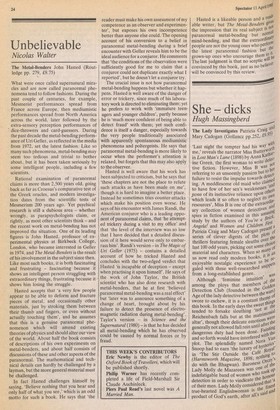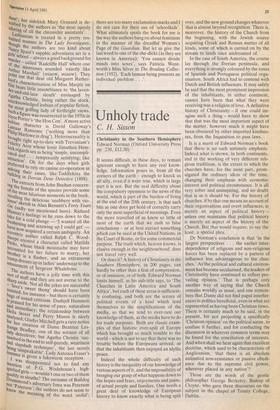She dicks
Hugh Massingberd
The Lady Investigates Patricia Craig and Mary Cadogan (Gollancz pp.252, 'Last night the tempter had his way With me,' reveals the narrator Miss Butterwm in Lost Man's Lane (1898) by Anna gathar` me Green, the first woman to write delec; tive fiction. However, Miss B was aci. referring to an unseemly passion but to her failure to resist the impulse towards detectding. A meddlesome old maid who claimed to have few of her sex's weaknesses 'arl, pone of its instinctive reliance upon other,: which leads it so often to neglect its ovi" resources', Miss B is one of the extraordindary collection of women detectives 3:130 spies in fiction examined in this arrot° study by the authors of You're a Br"',' Angela! and Women and Children Firs:' Patricia Craig and Mary Cadogan Pfesea`,f series of clever digests of the thrillers featuring female sleuths plots over the last 100 odd years, picking out some clWied material and characters. When so tnarlY -11 us now read only modern books, it iS a enjoyable nostalgic experience to galed with these well-researched sn P e rpret; from a long-established genre. Although 'feminine intuition' whase among the ploys that members of,to Detection Club (founded in the74) Age of the lady detective between the Wa',4 swore to eschew, it is a constant thetnP this book. In the early days the sweet thing tended to forsake sleuthing 'rot at t.al Reichenbach falls but at the matrinamlife altar', though their delicate emotions weeb'e generally not allowed full rein until after ! dangerous duty had been done. Faill'er and so forth would have interfered with the plot. The splendidly named Nora ter .es' ter .es' Snoop had to earn 'the luxury of hY'L-Ovi in 'The Stir Outside the Cafe -1 to (Harrnsworth Magazine, 1898; n.nthing do with the Bhagwan). Baroness Offz,Y m he Lady Molly de Mazareen was one indefatigable band of women who took uurr detection in order to vindicate the hoc:a of their men. Lady Molly considered thmest true-hearted Englishwoman is the fill rid product of God's earth, after all's said a done; her sidekick Mary Granard is deScribed by the authors as 'the most openly adoring of all the chronicler assistants'. Lesbianism is treated in a pretty restrained manner in The Lady Investigates, tmlic'ugh the authors are too kind about `74,11cY Spain's sapphic adventures set in a girls' school – always a good background for murder — called 'Radcliffe Hall' where one (3f the mistresses sounded 'exactly like Arthur Marshall' (miaow, miaow). They Point out that dear old Margaret Ruther rd's characterisation of Miss Marple on 4111111 bears little resemblance to 'the laven He old-lace sleuth' envisaged by 'Igatha Christie, being rather the stock, unacknowledged lesbian of popular fiction, the stout golfing lady of forthright views. a figure was resurrected in the 1970s in oyce Porter's 'the Hon Con'. A more active Lesbian character is David Galloway's pha!fl, aar Ransome ('nothing more than :thiP Marlowe in drag'). Heterosexuality is 1roirght right up-to-date with Trevanium's et,leirY Arce whose lover Jonathan Herri°eic regards sex as being 'simple, uncomplicai,ed and . . temporarily satisfying; like urination'. Oh Preferred for the days when girls to rely on canine co-operation in !I:lying their cases, like Toddlekins the uulldog in Dorcas Dene Detective (1898). The extracts from John Buchan concernr,fg ,the female of the species provide some tne most hilarious moments in the book, riecalting." the delicious 'snobbery with violence' sketch in Alan Bennett's Forty Years tiun (sadly not mentioned here). Richard annaY's feelings as he runs down to the fake for a cold plunge — 'I wanted all the hIshening and screwing up I could get' — 'ye now acquired a certain ambiguity. An teLeeentric author called Ralph C. WoodmrPe created a character called Matilda 7rks, whose black moustache may have ak`counted for her failure to marry; her 't-'rother is a flasher, and an extraneous rum]) dresses up in ladies' underwear to the amusement of Sergeant Whalebone. The authors have a jolly time with this sort Lil of stuff and they are not averse to the rP aside. Not all the jokes are successful !ove's sweet thong' should have been rbesisted, for instance – but there is certainly ags of sound criticism. Dashiell Hammett 1..s praised for his sense of pace, naturalism crTri Immediacy; the relationship between "ella Street and Perry Mason is nicely fanalYsed; Gladys Mitchell gets a rave notice It her creation of Dame Beatrice Lesitange Bradley, one of the wittiest of all 'adY detectives; but Agatha Christie 'suecuinbed in the end to self-parody, weariness )11 slapdash technique', the last novels 'e ng 'unspeakable'. Lady Antonia Fraser's mtma is given a lukewarm reception. I was disappointed not to find a. ny Mention of P.G. Wodehouse's highspirited girls— wouldn't one or two of them Qualify as sleuths? The surname of Bulldog ururnmond's adversary Irma was Peterson not 'Paterson% the authors do not seem to MIN, the meaning of the word 'stolid'; there are too many exclamation marks and I do not care for their use of `schoolkids'. What ultimately spoils the book for me is the way the authors bang on about feminism in the manner of the dreadful Woman's Page of the Guardian. But let us give the last word to one of the she-dicks (as they are known in America): 'You cannot divide ; minds into sexes', says Patricia Went; worth's Miss Silver in The Brading Collection (1952). 'Each human being presents an individual problem . .











































 Previous page
Previous page